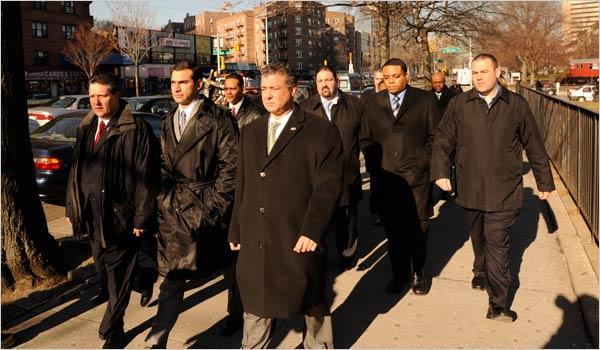Strengthening New York’s Public Safety: Prioritizing Support for Detectives on the Front Lines
Current Obstacles Confronting New York Detectives
Detectives in New York City face an increasingly intricate and demanding environment shaped by rising violent crime rates, evolving legal frameworks, and intense public scrutiny. Balancing proactive crime-fighting efforts with the imperative to build community trust has become a delicate task. Limited resources and bureaucratic complexities further hinder their ability to operate effectively, especially as reform initiatives introduce new policies without adequate backing. This dynamic is compounded by widespread skepticism fueled by sensational media narratives, which often cast doubt on law enforcement’s legitimacy.
Additional challenges impacting detective work include:
- Growing caseloads amid a shrinking pool of specialized investigators
- Rapid technological advancements necessitating ongoing training
- Restrictions on surveillance and investigative techniques
- Pressure to produce swift results while upholding legal standards
| Challenge | Effect on Investigations |
|---|---|
| Staff Shortages | Extended case resolution times |
| Policy Limitations | Reduced proactive crime prevention |
| Community Distrust | Lower cooperation from witnesses and victims |
Political Resistance and Its Ripple Effects on Law Enforcement
When elected officials adopt adversarial positions toward law enforcement, the consequences extend well beyond rhetoric. Such opposition can severely damage officer morale, especially among detectives who already operate under high stress. Without steadfast political support, law enforcement personnel face increased dangers and diminished trust from the communities they serve. This environment contributes to recruitment challenges and higher attrition rates, ultimately weakening the police force’s capacity.
Communities bear the brunt of these effects, experiencing slower emergency responses, fewer solved crimes, and a surge in criminal activity. Recent data from metropolitan areas with heightened political opposition to policing reveal the following trends:
| Consequence | Impact on Public Safety | Community Repercussions |
|---|---|---|
| Decreased Police Visibility | Longer emergency response intervals | Increase in burglary and theft |
| Low Officer Morale | Elevated turnover rates | Weakened public confidence |
| Funding Reductions | Fewer training opportunities and resources | Scaling back of crime prevention initiatives |
- Recruitment struggles: Decline in qualified applicants entering law enforcement careers.
- Escalated tensions: Fractured relationships between police and communities hinder investigations.
- Policy rollbacks: Essential investigative tools and tactics face restrictions or elimination.
Fostering Unified Leadership to Enhance Community Safety
Ensuring public safety in New York demands a collaborative leadership approach that bridges divides rather than deepens them. Law enforcement agencies, civic leaders, and policymakers must cultivate mutual trust and maintain open communication to effectively tackle complex safety challenges. Providing detectives with adequate resources, respect, and clear guidance not only improves investigative success but also safeguards neighborhoods from escalating threats. Conversely, confrontational dynamics between officials and frontline officers erode morale and diminish collective efficacy.
Key strategies to build this cooperative framework include:
- Establishing multidisciplinary task forces that incorporate community representatives alongside law enforcement experts.
- Implementing joint training initiatives focused on de-escalation techniques and cultural awareness.
- Adopting data-driven policing models to promote transparency and measurable outcomes.
These measures not only strengthen detective operations but also foster enduring public trust. Without leadership committed to standing with those who protect the city, public safety risks becoming collateral damage in political disputes.
Strategic Policy Actions to Empower Detectives and Boost Morale
To reinforce detective units effectively, city officials must commit to ongoing investments in cutting-edge investigative technologies and comprehensive training programs. Tools such as AI-enhanced data analytics and state-of-the-art forensic laboratories can accelerate case processing and reduce backlogs. Additionally, continuous professional development through specialized workshops equips detectives to adapt to emerging crime patterns while ensuring adherence to legal protocols.
Recommended initiatives to support detectives include:
- Allocating increased funding specifically for detective resources and technology upgrades
- Providing mental health services and resilience training to address occupational stress
- Creating transparent career advancement pathways to improve retention rates
- Strengthening partnerships with community organizations to enhance intelligence sharing
| Resource | Benefit | Approximate Investment |
|---|---|---|
| Advanced Digital Forensics Center | Speeds up evidence processing and analysis | $600,000 |
| Specialized Training Programs | Enhances investigative expertise and adaptability | $175,000 annually |
| Wellness and Support Services | Boosts morale and reduces burnout among officers | $90,000 annually |
Conclusion: A Call for Unified Commitment to Public Safety
As New York continues to navigate the complexities of crime and community relations, it is imperative that leadership unequivocally supports the detectives and officers who serve on the front lines. These professionals are essential to preserving order and safeguarding residents. Political leaders who choose collaboration over confrontation will be better positioned to address the city’s multifaceted challenges. Moving forward, a steadfast dedication to transparency, partnership, and policies that reinforce safety while respecting civil liberties will be crucial to securing a safer future for all New Yorkers.













